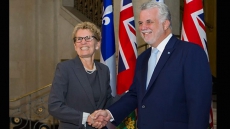OTTAWA - Prime Minister Stephen Harper, his spokesman in Parliament and even the U.S. ambassador reached out Friday to clarify whether Canada will expand its role in the battle against Islamic militants in the Middle East.
The Conservative government has faced sharp criticism for a lack of transparency on the role the Canadian Forces will play in dealing with the threat of the violent Islamic State of Iraq and the Levant taking shape in Iraq, Syria and elsewhere.
Harper made it abundantly clear that Canada could well end up providing more of a contribution than the 69 special-forces "advisers" who are currently taking part.
"There is a real threat against us," an animated Harper, flanked by European leaders in town to cement their new trade relationship with Canada, told a news conference on Parliament Hill.
"We cannot have a terrorist caliphate controlling a large swath of territory and carrying out terrorist attacks against targets here and around the world. We cannot accept that."
Harper revealed during a public interview with the Wall Street Journal in New York this week that the U.S. had recently asked Canada to expand its role in the battle against the marauding al-Qaida splinter group known as ISIL.
The comment only fuelled criticism back home that he had not been forthcoming with Canadians about military plans, since he had been pressed for that kind of information in the Commons.
A news report Thursday that said it was Ottawa that approached Washington with a military offer, rather than the other way around, added to the confusion.
"I find this kind of bizarre," Harper said when asked about the report. "Is this seriously suggesting that Canada is dragging the U.S. into military conflict? Let's be serious here."
U.S. ambassador to Canada Bruce Heyman waded in saying Washington asked Canada for help, insisting that the sequence of conversations and communications between the two countries is of no matter.
"We're actually not delineating in public conversation exactly what we're asking for. We're leaving that to dialogue and conversations between our two governments," Heyman said in an interview with The Canadian Press.
"But we are asking very specifically for additional support and help at whatever level Canada feels comfortable providing."
Harper said the American requests are under consideration.
"I don't want to suggest for a second that we do this reluctantly," he said.
"We will always make our own decision, but we will make those decisions based on our capacity and based on our objectives. Ultimately, it is not our intention not to support our allies."
He went on, presumably to make clear where his Conservative government stands on the question of taking the fight to ISIL.
"This phenomenon is a direct threat to the security of this country," Harper said.
"People in this country should be under no illusion about this, as they are not in most of the world. These are extremely dangerous people who have continued to operate like this (and) will almost certainly launch terrorist attacks against a range of targets across the world, including this one. That has to be countered."
Foreign Affairs Minister John Baird said Thursday that if Canada were to contemplate playing a combat role, such as participating in airstrikes, it would be subject to a vote in Parliament.
Shortly before Harper's news conference Friday, his parliamentary secretary Paul Calandra offered an emotional apology to the House of Commons for failing to answer direct questions on the military plans.
When NDP Leader Tom Mulcair had asked him about the Forces, Calandra responded repeatedly with a non-sequitur on Israel.
"I allowed the passion and the anger at something I read to get in the way of appropriately answering a question to the leader of the Opposition," said Calandra, whose responses had been the fodder of viral social media ridicule.
"For that I apologize to you and to this entire House and to my constituents."
Mulcair said he accepted Calandra's apology. He encouraged the Conservatives to make public any exchange of letters that had transpired with Washington.
"I think we have to get to that point where we understand that Parliament's not an afterthought," Mulcair said Friday.
"Harper when he was leader of the opposition promised a consultation, full information, a vote on any military mission...We are expecting the government to come, provide full information and a proper vote."





